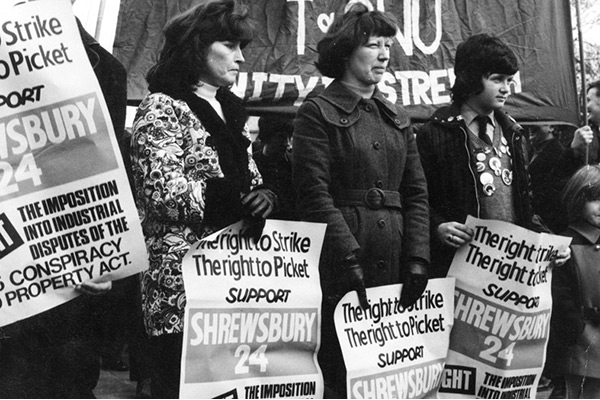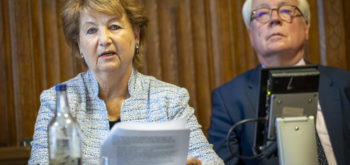I interview the chair of the Criminal Cases Review Commission (CCRC) within hours of the Court of Appeal ruling in the Post Office Horizon cases. As a long term observer of the miscarriages of justice watchdog, I feel bound to reflect upon the irony. You can wait a long time for a successful referral from the CCRC (over the last four years, there have been on average just 18 a year); and on the very day you’re scheduled to interview its boss, 39 arrive.
The case has been described in the press a number of times as ‘the biggest miscarriage of justice in British legal history’. It’s huge moment for the CCRC. The wrongful convictions have devastated the lives of not just the sub-postmasters but families and loved ones, robbed them of their livelihoods and in some cases their liberty and lives. ‘You can see just how much the experience has impacted people’s lives,’ Helen Pitcher tells me. ‘Our roles was to do the job thoroughly and not to keep people waiting with the excuse of COVID-19. I am really pleased with my team that we’ve managed do this.’
Helen Pitcher is keen to take credit on behalf of the CCRC and fair enough (sub-postmasters I have spoken to give the CCRC, slow to get started, a qualified thumbs up). ‘My team has spent thousands and thousands of hours on these cases,’ Pitcher says. Without a pause, she adds ‘some might say’ they all relate to the flawed Horizon system and ‘all the facts are similar’. ‘They aren’t,’ she says. ‘They are very specific to the individual facts and circumstances. We had to look at them all.’
How many hours has the watchdog spent on the Horizon cases? ‘Literally thousands and thousands,’ Pitcher replies. ‘We deliberately don’t do time-recording.’ Why not? It seems rather odd for an organisation that can seem fixated on deadlines (as determined by the Ministry of Justice’s key performance indicators that mainly relate timeliness and only briefly mention quality of investigation) to not actually record how long it take them to investigate cases. She explains that the CCRC wants its case review managers to understand ‘that there is no clock’ and that they can ‘spend as much time on a case as they need to spend on it’.
We meet via Zoom to talk about the recent Westminster inquiry’s critical but supportive report on the CCRC. Two years ago the All Party-Parliamentary Group on Miscarriages of Justice commissioned the investigation after the number of cases of people claiming to be wrongly convicted being sent to the Court of Appeal by the Birmingham-based group collapsed (from an average of 33 referrals a year to just a dozen cases in 2016).
The Westminster inquiry revealed that the CCRC had suffered the ‘biggest cut’ of any part of the criminal justice system since 2010 and its caseload has more than doubled over the same period. The watchdog received just £5.9m in 2019 compared to £9.2m in 2004. As well as calling for more funding, it argued that the CCRC’s statutory test for referrals (the ‘real possibility’ test) was making the group overly ‘deferential’ to the Court of Appeal. The report arrived six years after the House of Commons’ justice committee made pretty much the same suggestions.
Depressingly, the justice minister Alex Chalk last month appeared to brush aside each of the Westminster Commission’s sensible and modest recommendations. Instead, the Tory MP was proud to report that this year marks a bumper crop of referrals for the CCRC: 70.
The minister acknowledged a ‘significant proportion’ related to just one case. He didn’t point out that 51 referrals related to the Post Office Horizon debacle and a further six to Shrewsbury 24 which was a case initially rejected by the CCRC and was only referred after a challenge in the High Court.
*
Every year about 1,500 people apply to the CCRC, mainly prisoners. Is there a danger that other applications suffer because an under-resourced CCRC struggles to cope with the demands imposed by a single source of work such as the Horizon cases? Pitcher says not. ‘We allocate particular teams to particular cases to make sure that we don’t get swamped whether it is the Post Office, Shrewsbury or the Oval cases.’
‘I do have an issue at the moment,’ she adds. She points out that on average the CCRC’s case review managers have 16.5 applications at any one time and her ‘ideal’ is 12. ‘We’re really pleased that there is now a push to give us more budget to enable us to recruit more people to get it down to 12. Twelve is manageable.’ Pitcher told the Westminster Commission that the Birmingham-based group ‘ideally’ needed 45 case review managers but had just 31.
There has been a funding crisis at the CCRC for more than half of its life. I recall interviewing the then chair Graham Zellick (Pitcher’s tutor at law school) for The Times in 2008 when he talked of his staff being ‘angry’ and ‘dispirited’. ‘If you compare our £8 million budget with the amount of money spent on the other side by the police and Crown Prosecution Service, it is not even a crumb off the table,’ Zellick told me.
His successor, and Pitcher’s predecessor, Richard Foster didn’t speak out about the group’s obvious funding problems until after he announced he leaving after a decade in the job. When Foster did speak out, he revealed the extraordinary fact that for every £10 that the group had to spend on a case a decade ago, they had only £4.
‘Yes, we need more budget,’ Pitcher says. ‘We are always looking at ways to improve our efficiency; we’ve transformed our case management system and our IT system; notwithstanding that we do need more money and we need it for a variety of reasons from prioritising frontline casework; but also outreach. It is amazing how many people don’t know who we are or believe that we will charge them a fee; even talking to some criminal barristers, they will say: “That is interesting, what do you do? They haven’t heard of us.” We need to get those messages out.’ Indeed; it sounds a bit grim when you have to explain to defence lawyers what you do for a living when you’re the head of the organisation responsible for investigating wrongful convictions.
Doesn’t the chair of an independent watchdog need to be telling the MoJ how much it needs to do its job in the clearest language? Pitcher says she is ‘very comfortable pushing it and my MoJ counterparts will tell you I do so robustly and vigourously. We are knocking on an open door by and large.’
In the House of Commons, Alex Chalk appeared to dismiss the Westminster Commission’s concerns about the long-term underfunding of the watchdog. Instead, he claimed that the MoJ has provided the group with ‘substantial capital funding over the past two years so that it can upgrade its IT systems and improve its casework processes’. ‘That investment alone totals more than £1.5 million, and it will support the CCRC in delivering high-quality casework.’
Were Pitcher disheartened about the minister’s response in the House of Commons? ‘No, I didn’t hear it as negatively as that. He talked about the centrality of what we do and how we do it to the system.’
The cause of ‘miscarriages of justice’ is not a political priority and hasn’t been since the early 1990s, maybe public concern about the sub-postmasters will help change that. As Pitcher puts it: ‘We aren’t flavour of the month. It is not unusual for the average person on the street to think “there’s no smoke without fire” and if you’ve been prosecuted you must’ve done something wrong; if that was the case, we wouldn’t need the CCRC because by definition everyone would be guilty. I’m hoping when people hear the real stories and the real pain that those who have gone through miscarriages of justice feel, how it effects there entire life and follows them wherever they go, we will get more sympathy and more support.’
The CCRC is anticipating a glut of applications post-pandemic. ‘Prisoners have been locked up, don’t get access to a mobile phone and so numbers of applications have fallen,’ she says. ‘The backlog in our court is over 55,000 cases and [delays] effect witnesses’ memory and peoples’ views of credibility and so we will definitely need even more budget after the additional budget I am hoping I’m going to be granted in the not too distant future.’
*
The starting point for the Westminster Commission was concern over the collapse in referrals. Does Pitcher accept that CCRC isn’t sending enough cases back to the Court of Appeal? ‘No, I don’t,’ she replies. ‘We cannot predict any year how many miscarriages of justice there will be… . Across our existence we have referred over 750 cases. That’s quite a number.’
Pitcher has previously said that referrals were ‘not the be-all and end-all’ (and Alex Chalk in Parliament said referrals were not the only way of measuring success for the CCRC). ‘To judge us just on referrals could drive the wrong behaviour,’ reckons the CCRC chair. ‘When we do refer the case it gives those individuals huge hope. If we are referring them, thinking they haven’t got a chance and this isn’t going to satisfy the ‘real possibility’ test then it’s pointless doing it and an unnecessary cost to the system. I suspect there would be another wholesale review saying we were not fit for purpose for a whole different reason.’
Whatever the CCRC says, the bottom line is that the watchdog is always going to be judged on referrals (and rightly so). Some objected to Pitcher’s choice of language because it fed the concern that that the commission was attempting to redefine its own purpose as an audit body for the justice system. What do she say to such critics? Pitcher says: ‘If you were to go into the CCRC, to a person everybody would say our core purposes is to uncover miscarriages of justice; that belief is so strong; when we have a referral, you can tangibly feel how pleased people are. Everybody is clear that’s why they are there.’
But the CCRC has ‘a thematic role to play’, she adds. She points to the Post Office cases where she wrote to the House of Commons’ justice select committee arguing that ‘it was wrong that an organisation like the Post Office can be a victim, the investigator and the prosecutor in a case’. The CCRC highlighted the widespread disclosure failures in the wake of the Liam Allen case in 2018 – around one in five referrals where convictions were quashed were based on grounds of non-disclosure.
What issues have the CCRC raised recently? She points to their calls for an increase in legal aid rates for lawyers working on criminal appeals; support for the victims of miscarriages of justice; and juries. ‘A jury should be encouraged to give reasons,’ she says. ‘If we have a court judgement, we can look at the reason for the decision; if we have a jury judgement, we have a guilty or not guilty verdict.’
 Earlier in the year, the Court of Appeal overturned the convictions of members of the so called Shrewsbury 24, construction workers claiming to have been wrongly jailed following an industrial dispute back in the 1970s. It was a mixed result for the CCRCas they had previously rejected their application after having spent five years investigating it. The watchdog only changed its mind after being challenged through the courts by the applicants. Pitcher later issued a statement saying: ‘Some will think this has not been the commission’s finest hour, but it does at least show that we are an organisation that can revisit a decision impartially and where necessary change its mind.’
Earlier in the year, the Court of Appeal overturned the convictions of members of the so called Shrewsbury 24, construction workers claiming to have been wrongly jailed following an industrial dispute back in the 1970s. It was a mixed result for the CCRCas they had previously rejected their application after having spent five years investigating it. The watchdog only changed its mind after being challenged through the courts by the applicants. Pitcher later issued a statement saying: ‘Some will think this has not been the commission’s finest hour, but it does at least show that we are an organisation that can revisit a decision impartially and where necessary change its mind.’
The CCRC and MoJ has come under flak for changing the terms and conditions of its commissioners. CCRC commissioners used to be appointed on a near full-time basis; however in 2017 commissioners were recruited on minimum one-day-a-week contracts with none of the benefits. ‘Interestingly’, Pitcher notes that the decision to reject the Shrewsbury case was made when they had full-time commissioners. ‘It’s a controversial thing to say – and it may not go down well with some of my former colleagues,’ she says.
Whilst the controversy over the change in the CCRC commissioners’ terms appears to be a ‘human resources’ issue, critics (including the Westminster Commission and former commissioners) argue it has undermined the organisation and needs to be addressed in parliament. The CCRC is obliged by statute to have 11 commissioners and it takes the agreement of three to refer a case. The Westminster Commission heard that the overall level of commissioner resource fell from 8.8 full time equivalent posts in 2014 to just two and a half by 2019. These changes were implemented following a review by the MoJ and, according to the inquiry, faced ‘strong opposition within the CCRC’.
At the start of Westminster report, it is stated that the change has ‘undermined the spirit and purpose’ of the legislation that established the CCRC. It then goes on to note: ‘The CCRC is operating in a completely different way’.
The inquiry referred to board minutes which recorded commissioners being told by a senior civil servant that if the ministry’s recommendations were not introduced their appointments ‘might be terminated or not renewed’. The foreword of the subsequent MoJ review noted that the minister would be taking ‘a keen interest’ in the ‘timely implementation’. The human rights group JUSTICE said this ‘suggests an unlawful interference by Government with the independence of the CCRC’. It was a view emphatically endorsed by the Westminster Commission.
Pitcher defends the decision to change the tenure of commissioners arguing, instead, that the new arrangements enhanced their independence. The new commissioners are ‘not dependent on the MoJ for their livelihood or us through MoJ’, she says. ‘I think that speaks to far more independence of decision-making than if you are full-time, pensionable and have a fixed term which they had through Royal warrant. I would argue the other way: there is less chance of independence if you a fully reliant on the role for full pay.’
The CCRC was set up as a result of a Royal Commission as a response to public outrage about scandals including the Birmingham Six, Guildford Four and Cardiff Three. The independence of the CCRC was supposedly guaranteed by statute through the role of the eleven commissioners.
If the government wants to change the CCRC, surely that needs to be done with parliamentary scrutiny and not in response to a behind the scenes MoJ review? Do these arrangements now need to be revisited by Parliament? ‘I don’t think it does for a couple of reasons,’ she says.’ There was already a cohort of commissioners who joined on those terms and conditions before the tailored review. That change was already in place; and it’s in line with a number of other arm’s-length bodies where there has been a move to fee-paid systems.’ The ‘quantum of the fee’ is another matter, she says. ‘I do think that is open to debate.’
The high court (in the Gary Warner case) described the relationship between the CCRC and the MoJ during that period as ‘very poor… even dysfunctional. ‘The poverty of this relationship undoubtedly tested the CCRC’s ability to remain independent of MoJ, and to be seen to be so,’ it said.
Three former commissioners told the Westminster Commission about their concerns about the new arrangements. ‘I cannot see how one-day a week commissioners could ever fulfil the duties for which they were appointed… they would find it almost impossible to be anything other than “rubber-stamping” decisions,’ said one.
‘It is a misconception to think the role of the commissioner has been diluted. It hasn’t,’ Pitcher insists. ‘In the changes we’ve had to the governance of the organisation, which I wholeheartedly agree with, we’re focusing people on their strengths.’ She says that when she joined the commission she was not impressed with ‘the board structure and the behaviour in the boardroom’. ‘It was something we needed to address,’ she adds. In fact, Pitcher claims that there is ‘a causal link between our referral rates going up and those changes’.
The CCRC chair also insists that the commissioners are not working on a one-day a week basis. ‘Most would do on average two and a half to three days a week; and they do that routinely and that is focused on casework which is where there acute legal and analytical brains are best served – and they do a brilliant job. What Warner also said, despite slapping the MoJ on the wrist, was that we were and we are constitutionally and operationally independent, and that is true. We are.’
In parliament, Alex Chalk ‘welcomed’ the ‘High Court’s finding in July 2020 that the CCRC is both operationally and constitutionally independent of the MOJ’. ‘The judgment found that changes made as a result of the [Ministry of Justice] tailored review undertaken by the Department did not represent a diminution of the CCRC’s independence or integrity.’
There is an alternative reading of Warner. I put it to Pitcher that the judgement was saying that the CCRC should be constitutionally and operationally independent, and that was not being recognised by the MoJ. In other words, it was striking a cautionary note and absolutely not offering an endorsement of the commission’s independence. Readers can make up their own mind – see below.
‘Our view is we are independent,’ says Pitcher. ‘I personally will fight like tooth and nail if I have to. I do not have to do because it is not happening.’
The high court on the CCRC’s independence
Alison Wedge is the Head of MoJ’s Arm’s Length Bodies Centre of Expertise. That is a body which sits within the Chief Financial Officer Group within MoJ and has a stewardship role for ALBs across the department, in her own words, “leading on ALB assurance, partnership capability and driving forward the department’s strategy when working with public bodies”. Ms Wedge is employed by MoJ as a deputy director and she reports to the Permanent Secretary. Ms Wedge filed a witness statement for this judicial review dated 6 March 2020, in which she refers to the CCRC being “operationally independent” of MoJ. That same phrase was used by Mr Pobjoy, counsel for MoJ, during the course of his submissions. Certainly, the CCRC is operationally independent of Government. But in our judgment, following our review of the statute and the Framework Document and based on our understanding of the role occupied by the CCRC within the wider criminal justice system, the CCRC is much more than merely “operationally” independent; it is constitutionally independent from Government too, and must be seen to be so, if the public is to have confidence in its decisions.
Extract from Warner v SSJ, paragraph 18








